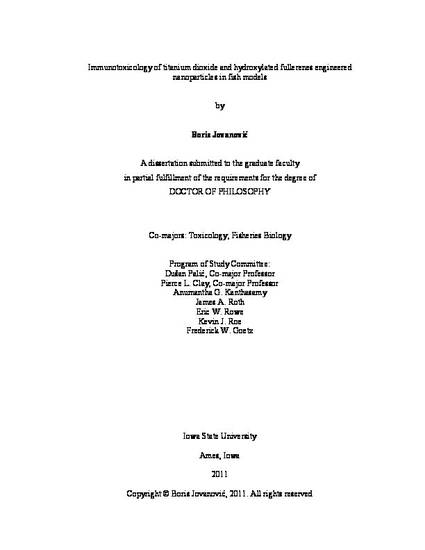
Nanoparticles have the potential to cause adverse effects on the fish health, but the understanding of the underlying mechanisms is limited. Major task of this dissertation was to connect gaps in current knowledge with a comprehensive sequence of molecular, cellular and organismal responses toward environmentally relevant concentrations of engineered nanoparticles (titanium dioxide - TiO2 and hydroxylated fullerenes), outlining the interaction with the innate immune system of fish.
The research was divided into following steps: 1) create cDNA libraries for the species of fathead minnow (Pimephales promelas); 2) evaluate whether, and how can nanoparticles modulate neutrophil function in P. promelas; 3) determine the changes in expression of standard biomarker genes as a result of nanoparticle treatment; 4) expose the P. promelas to nanoparticles and appraise their survival rate in a bacterial challenge study; 5) assess the impact of nanoparticles on neuro-immunological interface during the early embryogenesis of zebrafish (Danio rerio). It was hypothesized that engineered nanoparticles can cause measurable changes in fish transcriptome, immune response, and disease resistance. The results of this dissertation are: 1) application of environmentally relevant concentration of nanoparticles changed function of fish neutrophils; 2) fish exposed to nano- TiO2 had significantly increased expression of interleukin 11, macrophage stimulating factor 1, and neutrophil cytosolic factor 2, while expression of interleukin 11 and myeloperoxidase was significantly increased and expression of elastase 2 was significantly decreased in fish exposed to hydroxylated fullerenes; 3) exposure to environmental estimated concentration of nano-TiO2 significantly increased fish mortality during Aeromonas hydrophila challenge. Analysis of nano-TiO2 distribution in fish organism outlined that the nano-TiO2 is concentrating in the fish kidney and spleen; 4) during the early embryogenesis of D. rerio exposure to nanoparticles caused shifts in gene regulation response patterns. Significant effects on gene regulation were observed on genes involved in circadian rhythm, kinase activity, vesicular transport and immune response.
Available at: http://works.bepress.com/boris-jovanovic/1/
